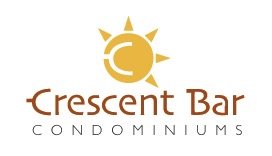Pet Policy
Crescent Bar Condominium Master Association Policy
Guest and Tenant Assistance Animal Policy
Policy Statement:
Crescent Bar Condominium Master Association (“CBCMA”) does not allow Guests or Tenants to have pets on the property. While CBCMA takes no position as to whether the Americans with Disabilities Act, the Fair Housing Act, and the Washington Law Against Discrimination apply to CBCMA because it is a private club and establishment, CBCMA nonetheless recognizes that assistance animals are not the same thing as pets, and adopts the following Assistance Animal Policy:
- Assistance animals include service animals and emotional support animals. Assistance animals are not pets.
- Assistance animals - an animal that works, provides assistance or performs tasks for the benefit of a person with a disability, or provides emotional support that alleviates one or more identified symptoms or effects of a person’s disability.
- Note – assistance animals are not limited to dogs.
- Note – assistance animals do not have to be certified or registered nor do they have to have received specialized training.
- Assistance animals - an animal that works, provides assistance or performs tasks for the benefit of a person with a disability, or provides emotional support that alleviates one or more identified symptoms or effects of a person’s disability.
- Crescent Bar members/owners who have Guests or Tenants on the property are generally required to accept assistance animals and should allow the person with a disability and their assistance animal in all areas where persons are normally allowed to go.
- If Crescent Bar members/owners are uncertain whether the person seeking accommodation has a disability and/or a disability-related need for an assistance animal, Crescent Bar members/owners may ask, if it is not clear or already known:
- For documentation of a disability and/or the disability-related need for an assistance animal. (Disability is a physical or mental impairment that substantially limits one or more major life activities.)
- Example: a note from a doctor or mental health professional that the animal provides support that alleviates one or more symptoms or effects of a disability.
- Any such documentation provided should be placed in the unit file and its privacy should be protected.
- If the person is not disabled or the animal is not providing disabilityrelated assistance, the request for reasonable accommodation of the assistance animal may be denied.
- For documentation of a disability and/or the disability-related need for an assistance animal. (Disability is a physical or mental impairment that substantially limits one or more major life activities.)
- Crescent Bar members/owners should not:
- Ask for documentation of the disability or the disability-related need for an assistance animal if it is apparent or already known;
- Ask for access to medical records or medical providers or to provide detailed or extensive information or documentation;
- Unreasonably deny a request for reasonable accommodation of the assistance animal;
- Unreasonably delay in responding to a request for reasonable accommodation of the assistance animal;
- Require pet fees or deposits for assistance animals; and,
- Limit assistance animals based on breed, weight or size.
- Crescent Bar members/owners may ask a guest or tenant to remove an assistance animal if:
- the specific animal in question would cause substantial physical damage to the property that cannot be eliminated or acceptably reduced by another reasonable modification; or
- the animal poses a direct threat to the health and safety of others that cannot be eliminated or acceptably reduced by another reasonable modification. (Examples: severe allergies, or the presence of a pet who is unable to share space with other animals due to safety concerns.)
- Note – determining an assistance animal would cause substantial physical damage or that an assistance animal poses a direct threat must be based on that specific assistance animal’s conduct, and not generalizations or stereotypes.
- If Crescent Bar members/owners are uncertain whether the person seeking accommodation has a disability and/or a disability-related need for an assistance animal, Crescent Bar members/owners may ask, if it is not clear or already known:
- Assistance animals are not pets. Therefore, no pet deposit for such animals will be allowed.
- Crescent Bar members/owners may retain some or all of a guest or tenant’s security deposit to compensate for damage beyond normal wear and tear caused by the guest or tenant and their assistance animal should it occur.
Pages
- Home
- History
- Owner Resources
- Welcome Letter
- Internet Access
- Remodeling/Construction Request
- Resale Certificate
- Rules and Regulations
- Pet Policy
- Violation Fine Schedule
- Winter Checks 2021-22
- Trailer Parking Policy 2024
- Contacts
- Committees
- External Resources
- Contact the Board
- Documents
- Secretary
- Resale Certificates
- Prospective Buyers
- Rentals
- Add your Rental
- Select Rentals
- Posted Rules
- Rental Information
- Crescent Bar Classifieds
- Our Location


